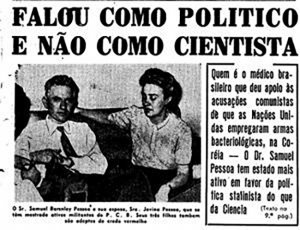Presented By: Center for Latin American and Caribbean Studies
LACS Lecture Series. From Beijing to Rio de Janeiro and São Paulo: The Rockefeller Foundation, Cold War, and Medicine in Brazil (1945-1964)
Gilberto Hochman, Professor of History of Sciences and Health, Casa de Oswaldo Cruz, Oswaldo Cruz Foundation (Fiocruz), Rio de Janeiro

Based on US and Brazilian archives, Gilberto Hochman will discuss the Rockefeller Foundation’s operations in Brazil during the Cold War and Brazil’s so-called democratic experience (1945-1964). In the post-WWII era, the Brazilian scientific and medical community included a large number of members and sympathizers of the then-outlawed Brazilian Communist Party (PCB). Particularly in the field of medical parasitology, a “Red network” linked several professors and researchers at a number of medical schools, many with strong ties to international leftist organizations and some involved in key episodes of the Cold War. This network was severely repressed by the military regime installed in 1964 with dismissals, arrests and exile of its members.
The presentation explores the routine activities of Rockefeller officials in Rio, who were immersed in the local, national, and global dimensions of the Cold War in the fields of science and medicine. At the office in Rio de Janeiro, RF officials faced major challenges managing funds and scholarships for this scientific and medical community and implementing guidelines from the New York headquarters. The RF was pressured from the investigations then underway in Washington, DC, into possible funding of communists and anti-American activities by philanthropic foundations, conducted by the Cox-Reece Committee (Select Committee to Investigate Tax-Exempt Foundations and Comparable Organizations, 1952-53). RF office also had to deal with the expectation of the medical schools and respond to Brazilian government demands regarding the modernization of medicine and science, especially from the Ministry of Education. The question was how to deal with these multiple pressures and to select the institutions and individuals that would receive funding balancing meritocracy and national and international politics. Through its Brazilian programs, the foundation blended medicine, science, and the Cold War against the backdrop of Brazil’s democratic yet unstable environment. The RF programs administrated in Rio de Janeiro eventually entangled China, Korea, Brazil, and the United States in a contextual fashion.
Dr. Gilberto Hochman is a Brazil Initiative/LACS visiting scholar for 2017-2018. He is a Researcher and Professor at the History of Sciences and Health Unit of the Casa de Oswaldo Cruz, Oswaldo Cruz Foundation (Fiocruz), in Rio de Janeiro, Brazil. His acclaimed study on the history of public health was translated and published in 2016 as “The Sanitation of Brazil: Nation, State, and Public Health in Brazil, 1889-1930” (University of Illinois Press).
The presentation explores the routine activities of Rockefeller officials in Rio, who were immersed in the local, national, and global dimensions of the Cold War in the fields of science and medicine. At the office in Rio de Janeiro, RF officials faced major challenges managing funds and scholarships for this scientific and medical community and implementing guidelines from the New York headquarters. The RF was pressured from the investigations then underway in Washington, DC, into possible funding of communists and anti-American activities by philanthropic foundations, conducted by the Cox-Reece Committee (Select Committee to Investigate Tax-Exempt Foundations and Comparable Organizations, 1952-53). RF office also had to deal with the expectation of the medical schools and respond to Brazilian government demands regarding the modernization of medicine and science, especially from the Ministry of Education. The question was how to deal with these multiple pressures and to select the institutions and individuals that would receive funding balancing meritocracy and national and international politics. Through its Brazilian programs, the foundation blended medicine, science, and the Cold War against the backdrop of Brazil’s democratic yet unstable environment. The RF programs administrated in Rio de Janeiro eventually entangled China, Korea, Brazil, and the United States in a contextual fashion.
Dr. Gilberto Hochman is a Brazil Initiative/LACS visiting scholar for 2017-2018. He is a Researcher and Professor at the History of Sciences and Health Unit of the Casa de Oswaldo Cruz, Oswaldo Cruz Foundation (Fiocruz), in Rio de Janeiro, Brazil. His acclaimed study on the history of public health was translated and published in 2016 as “The Sanitation of Brazil: Nation, State, and Public Health in Brazil, 1889-1930” (University of Illinois Press).